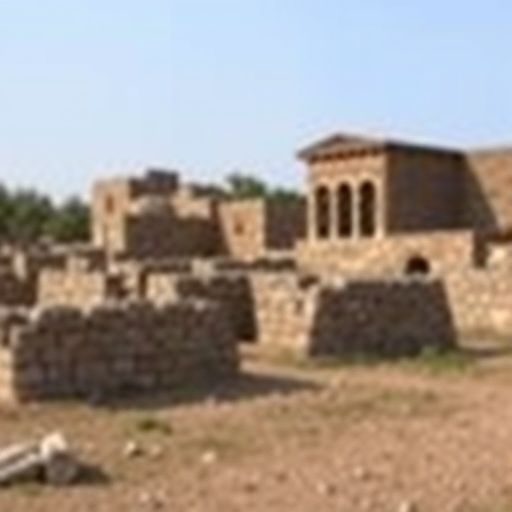In a groundbreaking study led by Professor Dan Lawrence from Durham University, researchers have explored the intricate relationship between wealth inequality and the persistence of human settlements over a span of ten millennia. This research, published in the special feature of the Proceedings of the National Academy of Sciences, provides significant insights into how unequal distributions of wealth correlate with the durability of societies throughout history. The analysis utilized data derived from a vast array of archaeological records, which included over 47,500 homes from more than 2,990 archaeological sites across the globe, offering a comprehensive view of human habitation over the past 10,000 years.
The key metric for measuring wealth inequality in this study was the disparities in house sizes, which served as indicators of social stratification across various cultures and epochs. The researchers meticulously analyzed how these differences in residential construction related to the length of time communities remained settled in particular locales. Their findings unveiled a notable correlation: settlements characterized by greater inequality, as evidenced by variances in housing sizes, tended to endure for more extended periods before eventual abandonment.
One of the most striking revelations from this study is its assertion that the correlation between inequality and settlement persistence does not imply a direct causal relationship. In other words, while both phenomena have been observed to rise concurrently alongside the growth and complexity of human societal systems, the research suggests that increased inequality is not a necessary condition for achieving societal sustainability. The implications of this conclusion may be profound, offering hope that humanity can navigate future challenges without resorting to escalating disparities in wealth distribution.
Professor Lawrence emphasized the importance of acknowledging the historical context linking inequality to sustainability. As societies evolve and their structures become increasingly complex, it appears that wealth inequality has risen hand-in-hand with longer settlement durations. However, this correspondence raises essential questions about our current trajectory, particularly in an era defined by stark economic divides and looming sustainability crises, including climate change.
Furthermore, Lawrence advocates for a deeper examination of earlier historical patterns as we grapple with contemporary issues of sustainability and equity. By studying the interplay between these two crucial dimensions—continuity and equality—we may glean insights that could inform future policies aimed at fostering more equitable and sustainable societies. In his own words, Professor Lawrence stated, “It is crucial for us to remain vigilant and responsive to the intricate historical relationships between inequality and sustainability as we navigate our current societal challenges.”
The research not only highlights the patterns of human development but also underscores the potential for societies to flourish without the pervasive presence of wealth inequality. This suggests that as we move forward, our strategies for sustainability and social equity need not be viewed as mutually exclusive. Instead, historical precedents demonstrate that it is possible for societies to achieve stability and complexity without exacerbating economic divides.
Moreover, the expertise involved in the compilation of this study is noteworthy, as it includes contributions from researchers across Europe and the United States. The collaborative effort brings together various perspectives and methodologies to deepen the understanding of wealth distribution’s historical context. This comprehensive approach is integral to the research’s validity, marking a significant achievement in archaeological and sociological studies.
The methodology employed by the research team involved rigorous statistical analyses of the wealth distribution data alongside archaeological findings. By harnessing both quantitative and qualitative data, the researchers constructed a nuanced model that elucidates the relationship between housing inequality and settlement persistence over millennia. This model serves as a valuable tool for scholars and policymakers alike, who are seeking to navigate the complexities of modern social systems.
As the study gains attention, it highlights the urgent need for interdisciplinary approaches in addressing systemic inequality and sustainability issues. The lessons drawn from this extensive research could not only inform academic discourse but also influence strategic policymaking aimed at mitigating inequality, fostering community resilience, and promoting sustainable practices moving forward.
In summary, the findings of this research illuminate significant historical patterns that may guide contemporary efforts to create more equitable societies. The relationship between wealth distribution and societal persistence is complex and multifaceted, suggesting that future development does not necessitate increased inequality. As human societies confront unprecedented challenges, the insights derived from the past may become invaluable in shaping a more sustainable and just future.
This exploration is particularly timely, considering the rising global wealth inequality that threatens to destabilize societies and jeopardize sustainable development. With the added pressures of climate change and social injustices, understanding the dynamics highlighted by Professor Lawrence’s research could not only inform theoretical discussions but may also inspire actionable change.
Ultimately, as we advance into the future, a thorough comprehension of the historical intertwining of inequality and sustainability could prove essential to fostering societies that are not only enduring but equitable. The findings from Durham University pave the way for renewed examination of the factors that underpin social structures, urging us to rethink conventional narratives about the necessity of inequality for progress.
In the pursuit of a future marked by equity and sustainability, reflecting on these insights may be instrumental in shaping both social policy and community initiatives. The ongoing dialogue spurred by this research can ignite a collective effort to embrace a more inclusive vision for humanity’s future.
Subject of Research: Wealth inequality and settlement persistence
Article Title: Housing inequality and settlement persistence are associated across the archaeological record
News Publication Date: 14-Apr-2025
Web References: DOI linked here
References: Data/statistical analysis from archaeological records
Image Credits: Credited to Durham University
Keywords: Sustainability, Inequalities, Archaeology




